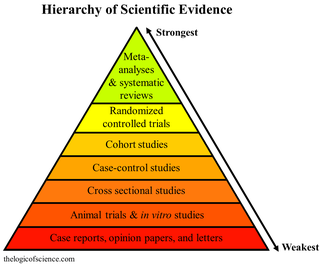Biostatistics is a branch of statistics that applies statistical methods to a wide range of topics in biology. It encompasses the design of biological experiments, the collection and analysis of data from those experiments and the interpretation of the results.

Statistics is the discipline that concerns the collection, organization, analysis, interpretation, and presentation of data. In applying statistics to a scientific, industrial, or social problem, it is conventional to begin with a statistical population or a statistical model to be studied. Populations can be diverse groups of people or objects such as "all people living in a country" or "every atom composing a crystal". Statistics deals with every aspect of data, including the planning of data collection in terms of the design of surveys and experiments.

A meta-analysis is a statistical analysis that combines the results of multiple scientific studies. Meta-analyses can be performed when there are multiple scientific studies addressing the same question, with each individual study reporting measurements that are expected to have some degree of error. The aim then is to use approaches from statistics to derive a pooled estimate closest to the unknown common truth based on how this error is perceived. It is thus a basic methodology of Metascience. Meta-analytic results are considered the most trustworthy source of evidence by the evidence-based medicine literature.

Epidemiology is the study and analysis of the distribution, patterns and determinants of health and disease conditions in a defined population.

Applied science is the use of the scientific method and knowledge obtained via conclusions from the method to attain practical goals. It includes a broad range of disciplines such as engineering and medicine. Applied science is often contrasted with basic science, which is focused on advancing scientific theories and laws that explain and predict natural or other phenomena.
Medical statistics deals with applications of statistics to medicine and the health sciences, including epidemiology, public health, forensic medicine, and clinical research. Medical statistics has been a recognized branch of statistics in the United Kingdom for more than 40 years but the term has not come into general use in North America, where the wider term 'biostatistics' is more commonly used. However, "biostatistics" more commonly connotes all applications of statistics to biology. Medical statistics is a subdiscipline of statistics. "It is the science of summarizing, collecting, presenting and interpreting data in medical practice, and using them to estimate the magnitude of associations and test hypotheses. It has a central role in medical investigations. It not only provides a way of organizing information on a wider and more formal basis than relying on the exchange of anecdotes and personal experience, but also takes into account the intrinsic variation inherent in most biological processes."
David George Clayton, is a British statistician and epidemiologist. He is titular Professor of Biostatistics in the University of Cambridge and Wellcome Trust and Juvenile Diabetes Research Foundation Principal Research Fellow in the Diabetes and Inflammation Laboratory, where he chairs the statistics group. Clayton is an ISI highly cited researcher placing him in the top 250 most cited scientists in the mathematics world over the last 20 years.
Genetic epidemiology is the study of the role of genetic factors in determining health and disease in families and in populations, and the interplay of such genetic factors with environmental factors. Genetic epidemiology seeks to derive a statistical and quantitative analysis of how genetics work in large groups.

James M. Robins is an epidemiologist and biostatistician best known for advancing methods for drawing causal inferences from complex observational studies and randomized trials, particularly those in which the treatment varies with time. He is the 2013 recipient of the Nathan Mantel Award for lifetime achievement in statistics and epidemiology, and a recipient of the 2022 Rousseeuw Prize in Statistics, jointly with Miguel Hernán, Eric Tchetgen-Tchetgen, Andrea Rotnitzky and Thomas Richardson.
Statistics education is the practice of teaching and learning of statistics, along with the associated scholarly research.
Annette Jane Dobson is a Professor of Biostatistics in the University of Queensland's Australian Women and Girl's Health Research (AWaGHR) Centre in the School of Public Health. Dobson was Director of the Australian Longitudinal Study on Women's Health from 1995 to 2013. She is a highly cited publication author, a book author, and has received an Australia Day award.
Nicholas Edward Day, CBE, FRS is a retired statistician and cancer epidemiologist.
Marvin Zelen was Professor Emeritus of Biostatistics in the Department of Biostatistics at the Harvard T.H. Chan School of Public Health (HSPH), and Lemuel Shattuck Research Professor of Statistical Science. During the 1980s, Zelen chaired HSPH's Department of Biostatistics. Among colleagues in the field of statistics, he was widely known as a leader who shaped the discipline of biostatistics. He "transformed clinical trial research into a statistically sophisticated branch of medical research."
Isabelle Boutron is a professor of epidemiology at the Université Paris Cité and head of the INSERM- METHODS team within the Centre of Research in Epidemiology and Statistics (CRESS). She was originally trained in rheumatology and later switched to a career in epidemiology and public health. She is also deputy director of the French EQUATOR Centre, member of the SPIRIT-CONSORT executive committee, director of Cochrane France and co-convenor of the Bias Methods group of the Cochrane Collaboration.
Elizabeth Anne (Lianne) Sheppard is an American statistician. She specializes in biostatistics and environmental statistics, and in particular in the effects of air quality on health. She is a Professor of Environmental and Occupational Health Sciences and a Professor of Biostatistics in the University of Washington School of Public Health. In 2021, Dr. Sheppard was named to the Rohm & Haas Endowed Professorship of Public Health Sciences.
Ralph Benedict D'Agostino Sr. is an American biostatistician and professor of Mathematics/Statistics, Biostatistics and Epidemiology at Boston University. He was the director of the Statistics and Consulting Unit of the Framingham Study and the executive director of the M.A./Ph.D. program in biostatistics at Boston University. He was elected a fellow of the American Statistical Association in 1990 and of the American Heart Association in 1991.
Josée Dupuis is a Canadian biostatistician. She is a professor in the Boston University School of Public Health, where she chairs the department of biostatistics. Her research interests include genome-wide association studies, gene–environment interaction, and applications to diabetes and cardiovascular disease.
Donna Spiegelman is a biostatistician and epidemiologist who works at the interface between the two fields as a methodologist, applying statistical solutions to address potential biases in epidemiologic studies.
Ronald S. Brookmeyer is an American public health researcher. He is a professor of biostatistics at the UCLA Fielding School of Public Health.




